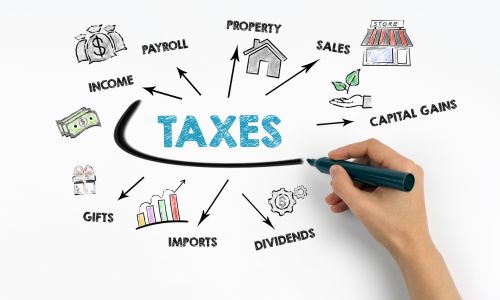Federal taxes constitute a critical component of a nation’s revenue system, providing the financial foundation for government operations and public services. These taxes are imposed by the central government on individuals, businesses, and other entities within its jurisdiction. In the United States, the Internal Revenue Service (IRS) is the federal agency responsible for overseeing the collection and enforcement of these taxes. Understanding the various types of federal taxes, their roles, and how they are collected is essential for citizens and businesses alike.
Types of Federal Taxes
Income Taxes
Income taxes are one of the primary sources of federal revenue. This tax is levied on the income earned by individuals and businesses. The United States employs a progressive tax system, where higher-income individuals are subject to higher tax rates. This system aims to distribute the tax burden more equitably across different income levels.

Payroll Taxes
Payroll taxes fund social insurance programs, namely Social Security and Medicare. These taxes are automatically withheld from employees’ paychecks to support these essential programs. Social Security tax contributes to retirement benefits, while Medicare tax funds health insurance for individuals aged 65 and older.
Corporate Taxes
Businesses are subject to corporate taxes on their profits. Corporate tax rates may vary based on the level of income, and deductions and credits are often available to incentivize certain behaviors or investments. Corporate taxes play a crucial role in generating revenue for the government and influencing corporate financial decisions.
The Role of Federal Taxes
Funding Government Programs
Federal taxes are the primary source of funding for government programs and services. These funds support a wide range of initiatives, including national defense, infrastructure development, education, healthcare, and social welfare programs. The allocation of tax revenue is determined through the federal budgeting process, reflecting the priorities and needs of the government and its citizens.
Redistributive Function
Federal taxes also serve a redistributive function, aiming to reduce economic inequality. Progressive tax systems, such as the one in the United States, tax higher-income individuals at higher rates. The revenue generated from these taxes can be used to fund social welfare programs that provide assistance to those in lower-income brackets, helping to create a more equitable society.
Economic Stabilization
In times of economic downturns, federal taxes can be adjusted to stimulate economic activity or address inflationary pressures. Tax policy can be used as a tool for economic stabilization, influencing consumer spending, investment, and overall economic growth. Adjustments to tax rates and policies are often part of broader fiscal strategies to navigate economic challenges.
How Federal Taxes Are Collected
Internal Revenue Service (IRS)
The IRS is the federal agency responsible for administering and enforcing tax laws in the United States. It oversees the collection of federal taxes and ensures compliance with tax regulations. The IRS also provides resources and assistance to taxpayers, including guidelines for tax filing, information on deductions and credits, and enforcement measures for those who fail to comply with tax laws.
Tax Filing Process
Individuals and businesses are required to file annual tax returns with the IRS. The tax filing process involves providing detailed information about income, deductions, and credits. Taxpayers use various forms, such as the 1040 series for individuals and different forms for businesses, to report their financial activities. The IRS uses this information to calculate the amount of taxes owed or the refund due to the taxpayer.
Enforcement and Compliance
To ensure tax compliance, the IRS employs various enforcement measures. These may include audits, investigations, and penalties for non-compliance. The IRS also educates taxpayers about their rights and responsibilities and provides tools and resources to facilitate accurate and timely tax filings. Compliance with federal tax laws is essential for maintaining the integrity of the tax system and funding government operations.
Criticisms and Debates
Fairness and Equity
One of the perennial debates surrounding federal taxes revolves around fairness and equity. Critics argue that the current progressive tax system, while designed to distribute the tax burden based on income levels, may still have loopholes and disparities that benefit certain individuals and businesses. Discussions on tax reform often center on finding a more equitable distribution of the tax burden.
Impact on Economic Behavior
Tax policies can influence economic behavior, and debates often arise regarding the potential impact of taxes on factors such as investment, entrepreneurship, and job creation. Advocates for lower tax rates contend that they stimulate economic growth by encouraging business investment and consumer spending. On the other hand, proponents of higher taxes argue that they are necessary to fund essential government services and address economic inequality.
Policy Debates
Taxation is a complex and multifaceted policy area, leading to ongoing debates on various tax-related issues. These may include discussions on specific deductions and credits, the appropriate level of taxation for different income groups, and the overall structure of the tax system. Policymakers continually grapple with balancing revenue needs with economic considerations and societal priorities.
Recent Changes and Developments
Tax Reforms
Tax policies are subject to change, and recent years have seen significant tax reforms. Legislative changes can impact tax rates, deductions, and credits for both individuals and businesses. Staying informed about these changes is crucial for taxpayers to navigate the evolving landscape of federal taxation.
Legislative Updates
Government authorities regularly evaluate and update tax laws to address emerging economic challenges and priorities. Legislative updates may include changes to tax rates, the introduction of new tax incentives, or modifications to existing tax codes. Keeping abreast of these updates is essential for taxpayers to comply with the latest regulations and take advantage of available benefits.
Conclusion
In conclusion, federal taxes are a cornerstone of government finance, supporting a wide array of programs and services that contribute to the well-being of a nation. Understanding the types of federal taxes, their roles, and how they are collected is crucial for individuals and businesses alike. The ongoing debates and discussions surrounding federal taxes highlight the complexity of this issue and the need for thoughtful policy considerations to ensure a fair, effective, and sustainable tax system. Staying informed about recent changes and developments in federal taxation is essential for navigating the ever-evolving landscape of tax policy.






